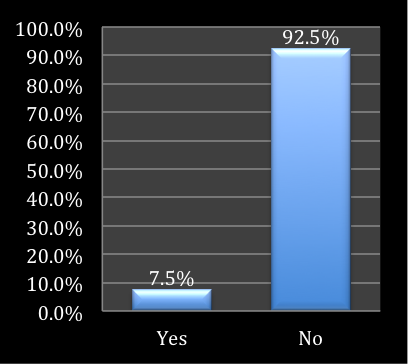Q17 required worship pastors to assess which goals, values, or objectives are most operative in their worship planning processes, specifically in the category of how worship elements are selected. Figure 2 represents their responses.
The data in Figure 2 show that the most influential factors that guide a worship pastor’s process for selection of worship elements are celebrating/rehearsing the gospel (36.5%), supporting the theme of the pastor’s message (18.0%), engaging the heart (16.9%), and conveying God’s immanent love, care and concern for his people (7.5%). Twice as many worship pastors indicate the priority of celebrating/rehearing the gospel over supporting the sermon theme and engaging the heart. Also, twice as many worship pastors selected supporting the sermon series and engaging the heart over conveying God’s immanence.
Greater clarity is achieved regarding the strength of influence when the most influential, 2nd most influential, and 3rd most influential goals, values, and objectives are considered collectively as indicated in Table 4. (The combined score presented in the “composite” column is the summation of most influential, 2nd most influential, and 3rd most influential data counts and percentages for each category)

Table 4. Composite of most, 2nd most, and 3rd most influential goals, values, and objectives (In each cell, the top number indicates the number of responses. The bottom number indicates the percentage.)
Figure 3 visually represents the above composite data contained in Table 4 ordered from lowest impact to highest impact.

Figure 3. Composite of the top three most influential goals, values, or objectives that influence the selection of worship elements by worship pastors
Celebrating the gospel (Christ lived, Christ died, Christ rose, Christ is coming again) is clearly the most impactful and foundational value governing how worship pastors select elements to be included in their services of worship. Enabling the heart to express joy, celebration, contrition, desperation, thanksgiving, awe, wonder, and other human emotions ranks as the second most influential goal of worship pastors. Musical considerations such as a song’s style, key, tempo, or singability ranks third.
Regarding the impact of the concepts of transcendence and immanence, Figures 4 and 5 vividly illustrate that conveying God’s transcendence usually is not the most influential goal, value, or objective that influences how worship services are planned.

Figure 4. Was transcendence indicated as the most influential factor in worship service planning in Q17?

Figure 5. Was transcendence indicated as one of the top three most influential factors in worship service planning in Q17?
In addition, transcendence tends not to be chosen as one of the top three most influential factors in worship service planning.
One line of inquiry of this research is as follows: “If representing God’s transcendence is not influential in the selection of worship songs or other elements to be included in worship services, what are the goals, values, or objectives that most strongly influence how a worship pastor selects worship songs or other elements to be included in his or her worship service?” Using the composite score presented in Table 4, the following are the top five responses in ranking order:
- To celebrate/rehearse the gospel—Christ lived, Christ died, Christ rose, Christ is coming again (57.2%)
- To engage the heart and express human emotion—e.g., joy, celebration, contrition, desperation, thanksgiving, awe, wonder, etc. (49.2%)
- The song’s style, key, tempo, or singability (40.8%)
- To support the theme of the pastor’s sermon or series (39.3%)
- To convey God’s immanence—his love, care, and concern for his people (27.8%)
Of special interest to this research is the relative strength of the influence of conveying God’s immanence compared to the relative weakness of conveying God’s transcendence. The influence of thinking about God’s love, care, and concern for his people (immanence) ranks in the top five influencers whereas conveying God’s distinction and separateness from his people (transcendence) ranks in the bottom five. Using the metrics presented in Table 4, conveying God’s immanence is three times more likely to influence worship planning than conveying God’s transcendence. It is also notable that nine other goals, values, and objectives rank higher than conveying God’s transcendence. Only two categories rank lower than transcendence in influence: honoring the traditions of a congregation and the popularity of a song.



